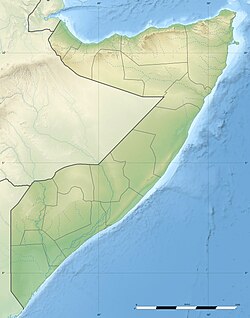History
On February 15, 1960, before Somaliland's independence, the first democratic elections were held in British Somaliland, and Ibrahim Eid was selected as the representative from Hudun. [6]
The Somaliland government did not hold polls here during the 2005 Somaliland parliamentary election, citing Hudun as a disputed territory. [7]
In March 2012, the militant group Al-Shabaab near Hudun was exterminated by Somali Federal Army and Ethiopian Army. [8]
In November 2012, the president of Khatumo State declared victory in the battle against the Somaliland army in Hudun. [9]
In January 2013, Khatumo militia based in southern Hudun were defeated and displaced by Somaliland forces. [10] The captured militia were imprisoned in Burao. [11]
In August 2017, the Somaliland government held a voting process for national elections in Hudun, which was opposed by Hudun residents as belonging to Puntland, and fighting took place between the Somaliland army and local forces in Hudun. [12]
In May 2021, voter turnout in Hudun and other Dhulbahante clan-inhabited areas in the Somaliland parliamentary election was significantly higher than in the previous election in 2005. [13]
This page is based on this
Wikipedia article Text is available under the
CC BY-SA 4.0 license; additional terms may apply.
Images, videos and audio are available under their respective licenses.

